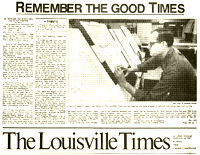138. Raw Onions and Garlic for Three Days
I've been following the confirmation process for James Holsinger, a well respected Kentucky doctor nominated by President Bush to be the nation's next Surgeon General. A few days ago I expressed to a staffer in Congressman Yarmuth's office my astonishment with my congressman's tacit endorsement of Dr. Holsinger, in spite of comments from the doctor's past which I find unacceptable. Yesterday, in a Senate hearing, Dr. Holsinger addressed those comments, from a paper he wrote in 1991, somewhat but not completely satisfactorily. He closed with the proposition that he would resign if he were forced by the president (which means the president's Orders of the Day from the vice president) into taking stances which were politically different from scientific standards, as a last resort. That is a strong statement. It doesn't solve the problem of the president's inability to administer the government in a religiously unbiased and scientifically informed manner, but it does mean he would have to go find another Surgeon General to advance his political and religious agenda. Dr. Holsinger would technically be Bush's second in that capacity - the first resigned and there is currently an Acting Surgeon General. President Clinton went through four during his eight years in office.
The comments which have given Holsinger problems were gay-related, and Dr. Holsinger admitted that many of the issues he raised in 1991 are now outdated. He further said his view that the gay lifestyle is "unnatural and unhealthy" has evolved. He didn't say what it had evolved into, but anytime a Republican nominee for anything even acknowledges that something can evolve, or has the possibility of evolving is certain progress.
In reading through yesterday's testimony, I found a reason to be supportive of Dr. Holsinger, not that I have a vote in the confirmation process (or for that matter a voice, given I am represented in the Senate by Mitch McConnell and Jim Bunning (who is believed to be 117 years old)). Here is what caught my attention. Dr. Holsinger admits to being a contrarion. I first learned that word back in 1990 when I served as a researcher for an attorney - cum - stock-research analyst, the late Frank X. Quickert, Jr., who was a most interesting man. Mr. Quickert loudly praised anything contrarion and used contrarion economic theory in his practice as a financial advisor. He was a very successful advisor.
Yesterday, Dr. Holsinger admitted to having a track record as a contrarion. He cited his support of raising tobacco taxes here in the Bluegrass State, where at one time tobacco was King - or maybe just Prince, as Coal was (and is) King. But what really got my attention was his statement that he would take on the pharmaceutical industry by calling for a ban on the advertising of drugs directly to consumers. That is something I fully support - banning drugs on TV, and for that matter on the radio and in the little banner ads that float around on the internet.
The expansion of television and other advertising for every ailment known and unknown exponentially expanded beginning in the early 1990s, formalized in August, 1997 when the FDA, with President Bill Clinton's approval, dramatically eased its guidelines on such propoganda, just in time for the 1996 loser in the presidential race to tell us about how he handles his erectile dysfunction. What the fuck? In my opinion, that was a subject about which only Mr. Dole and his lovely wife Mrs. Dole, and his doctors should be having a discussion, and not something necessary in an evening of television viewing. Fortunately, I gave up TV in 1984, but most of my friends and family haven't, so I've got to learn about cholesterol problems, menopause, acid reflux or GERD (imagine, I even know the acronym), asthma, osteoporosis, and any number of other things that actors portraying doctors tell me might be wrong with me. The one thing the 1997 rules required was a balancing act which required the manufacturers to give you the bad news as well - may cause drowsiness or kidney failure, not be to used by nursing mothers, don't take while operating a John Deere tractor, and other such vital information. This vital information is trivialized in a post-script and is usually uttered at a quick rate of speed, much like the tags on the end of a new car commercial. The "small print" is said quickly, and effectively ineffectively. That is the intent.
Some of the fine print may be beneficial. People should be told to ask their doctors about their individual problems. I have high blood pressure, asthma, and some allergies. I like to learn about the possible solutions for my discomforts from these ailments from a doctor, not a TV show. Then again, I have this friend in Estill County who tells me all the time all I really need to do is go on a fast, eating only raw onions and garlic for three days, then soaking in a bath of warm goat milk and all my ailments will disappear. He is into the herb as well. But, I digress.
Dr. Holsinger yesterday said his highest priorities as the new Surgeon General would be "fighting childhood obesity, eliminating tobacco use, and helping public-health first responders prepare for emergencies." Adding a ban on direct-to-consumer advertising of pharmaceuticals might push me over to a "Yes" vote for confirmation. The only side-effects would be less confusion, and less money spent on drugs, who wouldn't need all that income to pay for adveritising. Then again, maybe it is the drug companies who rule the country and not the gas, oil, and petrol people as I suggested yesterday.



























1 comment:
I agree with the doctor on the ads being placed for customer (patient)
enticement. I am especially concerned about the three page magazine ads. They list information that people who do not understand medicine, pharmacy labeling and packaging rules can not understand; nor are they familiar with the interactions of other medications.
But I would like to see the Surgeon General go one step farther and disallow drug companies to spend money on pens, clocks, lotions, Kleenex, notepads and other paraphernalia to supply to the doctors. Also stopping the evening dinners "field trips" or office lunches.
For what they spend on these "marketing materials" the drug companies could decrease the cost of each medication by millions per year. The marketing people could work on insurance companies and government agencies to help seniors and the poor afford their Rx instead of "bribing physicians".
Post a Comment